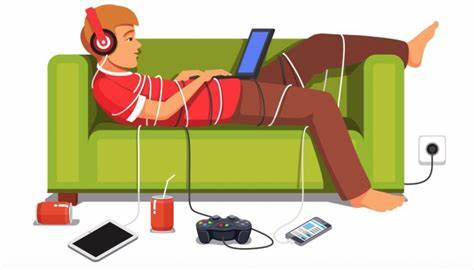Technology Addiction
Written by Sai Koppada
In a world where technology can be found everywhere from the doors of smart fridges to the screens of smartwatches, technology addiction is a genuine issue. Though this addiction is the same as a smoking addiction, it still poses great harm to your health. When an individual's tech usage actively affects their performance and lifestyle, that's when the person becomes a technology addict.
With so much exposure to technology in our day-to-day lives, getting addicted to technology can be easy. There are a few causes for this, the first being a positive dopamine feedback loop. To summarize, this type of feedback loop is the rush of excitement that occurs when you're scrolling through social media and swiping through reels. The sensation of happiness and content that you feel when you use a screen motivates you to remain glued to your device for hours on end. In most cases what started as a 10-minute break turns into hours of doomscrollig.
Another cause for this addiction is societal acceptance and early exposure to technology. Many children today are watching TV, playing video games, and doomscrolling through things like reels and shorts from a very young age. During my childhood I wasn’t introduced to social media and video games until I reached middle school, however, younger generations are exposed to this technology at a much earlier stage in their life. In some cases, they are even "born with a phone in hand," meaning that from a very young age, these children become addicted to things like short videos, reels, and video games.
This early exposure takes a hefty toll on their health and it can lead to many complications in their development and future. In some studies, it was even found that the effects of these conditions were just as bad as alcohol or drug addiction. Technology addiction can cause physical problems such as eye strain, and neck and back pain. This type of addiction affects the person's mental health as well, it can cause problems like anxiety, depression, and stress and it can even cause the brain to physically shrink. Excessive technology usage, especially from an early age can lead to complications with the development of cognitive and motor skills leading to other irreversible problems in the future.
In a world with a population of only 8 billion people, over 210 million are affected by technology addiction. This addiction has had a large impact on many people's lives and in most cases, people aren't even aware they they're addicted to their technology. This addiction has the potential to alter aspects of a person's life such as the amount of sleep and exercise they get.
Thankfully, the path to preventing and recovering from technology addiction is simple, though it may take time. Start by setting screen limits, creating device-free zones, and finding engaging activities. These steps reduce doomscrolling, boost productivity, and can even lower anxiety and depression.
Most times people use their phone because they’re bored and end up spending hours just scrolling through social media and are still left with a feeling of unease. By creating an interactive lifestyle for yourself you help keep yourself engaged and make a positive impact on your health.
Technology addiction is a condition that affects many people, we must take steps to prevent and recover from it.
References:
“What Is Technology Addiction?” Www.psychiatry.org, www.psychiatry.org/patients-families/technology-addictions-social-media-and-more/what-is-technology-addiction.
Written by Sai Koppada from MEDILOQUY


